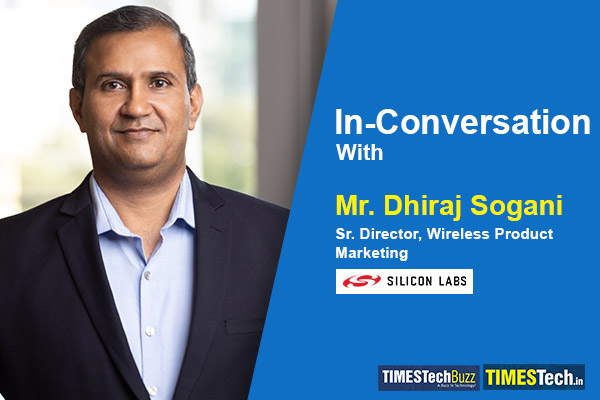In a recent interview with TimesTech, Dhiraj Sogani, Senior Director of Wireless Product Marketing at Silicon Labs, discussed the company’s strategic focus on smart metering (sm) within the broader IoT landscape. Sogani elaborated on the significance of smart metering in addressing energy distribution challenges in India, the benefits of Silicon Labs’ IoT solutions, security measures to counter IoT threats, and the company’s partnerships and plans to implement sm in the Indian market. He also highlighted emerging trends such as the convergence of IoT with AI and machine learning, showcasing Silicon Labs’ commitment to driving innovation in this dynamic field.
Read the full interview here:
TimesTech: How does smart metering fit into our broader IoT strategy and vision for the company?
Mr. Dhiraj: Smart metering is a significant focus area for Silicon Labs. We have a prominent presence worldwide in this market and are seeing a significant growth potential in the India market as well. We have a complete solution and several partnerships to address the requirements of this market. We are also investing to innovate and stay on the leading edge of the solutions for this market.
Indian power distribution faces a multitude of challenges in terms of effective distribution, efficient use of resources, and preventing power thefts. Smart metering could be the answer to all these challenges. It will also increase millions of people’s access to energy in both urban and rural settings.
Smart Metering stands as one of the burgeoning sectors within the realm of Internet of Things (IoT) in India, experiencing rapid expansion. The Indian government has already started an ambitious sm effort with the goal of deploying at least 250 million smart meters nationwide by 2025. Our technologies play a pivotal role in addressing the escalating demand for interconnected, intelligent devices in urban and municipal settings.
TimesTech: Comment on the scope of smart metering in India.
Mr. Dhiraj: The adoption and deployment of smart meters have been growing rapidly, becoming a top priority for government policies. At the 26th session of the Conference of the Parties (COP 26), India committed to an accelerated energy transition and to achieving net-zero carbon emissions by 2070 (MoEFCC 2022). Ensuring financial sustainability of electricity distribution companies (discoms), promoting efficient electricity use, and managing the rising electricity demand effectively are key to a successful energy transition.
India is implementing its Smart Metering Program to significantly improve the billing and collection efficiencies of Distribution Companies (DISCOMs). Smart meters will be the foundation for smart grid programmes which will be crucial to meeting challenges of the newly evolving energy mix and the target of providing uninterrupted 24×7 power supply to every Indian. As of February, 2023, nearly 5.5 million smart meters have been deployed in the country (NSGM 2023). Meeting the RDSS’s target would require deployment at a rapid scale (5.6 million smart prepaid meters per month).
Silicon Labs is a key enabler of the transition to smart meters. Our integrated Wi-SUN (Wireless Smart Utility Network) technology and partnership with Wirepas on their proprietary technology play a significant role in facilitating the development and operation of smart cities. Both Wi-SUN and Wirepas are specifically designed for large-scale IoT deployments, such as smart grid networks, advanced metering infrastructure, and intelligent transportation systems. This portfolio flexibility allows for Silicon Labs to provide a proven robust platform to the customers.
TimesTech: What are the key benefits of implementing smart metering in our IoT solutions?
Mr. Dhiraj: Implementing sm with Silicon Labs IoT solutions can offer several key benefits, both for end-users and service providers. Here are some of the key advantages:
- Higher Security: Silicon Labs is the leader in secure connectivity with Secure Vault and the capability for required certificate injunctions in addition to the security offered by the wireless protocol.
- A Complete Solution: Silicon Labs provides customers with not only a flexible platform for their meters, but also provides certified stacks and reference designs for most network node types to help speed up time to market and simplify the design process. It also has a strong roadmap to provide leading edge solutions such us machine learning, higher compute, lower power, higher security and better wireless performance.
- Enhanced Energy Efficiency: Users may track their energy usage in real time using smart meters, which offers insightful data on usage patterns. By enabling users to make knowledgeable choices about how to optimize their energy use, this data can boost energy efficiency and possibly result in cost savings. The Silicon Labs portfolio limits the amount of added energy consumption required to enable this functionality with our industry leading low power portfolio.
- Real-Time Monitoring and Alerts: Partnerships and experience with proven LPWAN technologies can give confidence in deploying with Silicon Labs technologies. With our proven track record in this feed, users and service providers can receive real-time data on energy consumption thanks to smart meters, allowing them to quickly spot anomalies, odd surges, or potential problems. With this skill, it is possible to take immediate action, such as finding leaks or appliance faults.
- Automated Billing and Reduced Administrative Costs: Smart metering enables automated and accurate billing based on actual usage, eliminating the need for manual meter readings and reducing administrative overhead for both consumers and utility companies.
- Demand Response and Load Balancing: Utilities can utilize smart meter data to implement demand response programs, encouraging consumers to reduce their electricity usage during peak periods. This helps to balance the grid, avoid blackouts, and reduce the overall strain on the energy infrastructure.
- Remote Management and Control: Smart meters that are Internet of Things (IoT) capable can be monitored and managed remotely, enabling utilities to remotely disconnect or reconnect service, improving efficiency and convenience for all parties. Silicon Labs provides tested and certified hardware and software solutions to ensure that our customers can deploy with the most robust solutions possible.
- Data-Driven Insights for Utilities: Smart meter data provides utilities with insightful information. They can identify places where energy usage can be reduced and improve energy distribution while also planning infrastructure enhancements.
TimesTech: What are some upcoming threats due to IoT technologies? How to keep up with these threats?
Mr. Dhiraj: As the number of connected devices grows, so does the threat landscape and vulnerabilities. Some critical and impending threats to IoT technologies that businesses and individuals must be wary of are security vulnerabilities, privacy concerns, cyber-attacks, and inadequate authentications and standardisation.
Security Vulnerabilities: Attackers continuously seek to exploit system weaknesses, posing a significant risk to the confidentiality, integrity, and availability of data. IoT devices collect vast amounts of sensitive data. As regulators and consumers demand greater data protection, IoT manufacturing companies must ensure strict adherence to privacy regulations and best practices to safeguard users’ personal information.
DDoS attacks: Another urgent threat to IoT devices can be that they can be hijacked to participate in large-scale Distributed Denial of Service (DDoS) attacks, causing widespread disruption and service unavailability to the targeted users.
Inadequate Device Authentication: Authentication mechanisms need to be smarter and evolving as weak authentication mechanisms can lead to unauthorised access. This unauthorised access then enables attackers to manipulate or control IoT devices remotely, to its detriment. In a Wi-SUN network, access is controlled via a certificate model that ensures on those devices with valid credentials are allowed to join and operate on the network.
Lack of awareness and standardisation: Lack of widespread knowledge about technology in the public and policy-making groups further distorts understanding of these threats and building standardised policies to ensure IoT security. The lack of standardised security protocols and practices across IoT devices leaves room for vulnerabilities and makes the ecosystem more susceptible to attacks.
At Silicon Labs, we implement security from the design level, with our industry-leading security suite, Secure Vault. It is the first in the world to be PSA Certified Level 3 and provides protection against scalable local and remote software attacks. By reducing the risk of security breaches and data theft, it significantly reduces the compromising of intellectual property, or revenue loss. Furthermore, our technology solutions are also tested by third-party laboratories to ensure ultimate security.
By taking proactive measures to tackle these and staying ahead of potential challenges, companies can prevent the loss of private data and reinforce the trust of their customers in IoT technologies. Thus, IoT developers must ensure ground-level practices like penetration testing, robust encryption, and authentication mechanisms to prevent unauthorised access and secure their supply chain management. While it is crucial for suppliers to keep up with providing security patches and new updates, it is also necessary for users and companies to be aware of these updates. Fostering a culture of security awareness among team members, customers, and end-users is critical to keep up with the evolving threats. Learning programmes and keeping up with the new technologies can ensure the same. Launched in 2022, Silicon Lab’s SILABSU is an effort to build a learning framework that provides access to technical knowledge and make training easily accessible to its global employees.
TimesTech: Silicon Labs’ plans and partnerships in India to implement smart metering.
Mr. Dhiraj: Smart metering has showcased rapid growth worldwide, and India has one of the most robust programmes to accelerate smart metering adoption. In June, Silicon Labs announced its FG28 System-on-Chip (SoC) designed for long-range networks and protocols like Wi-SUN, Wirepas, and other proprietary protocols. It will certainly help address the growing need for intelligent, connected devices in cities and different municipal environments. CyanConnode, a global leader in the design and development of Narrowband RF mesh networks, has chosen to incorporate our technology into its products, enabling high-quality solutions for India’s smart metering needs. The technology boasts a remarkable ability to function with minimal data loss over distances of up to 1.6 kilometers, both in urban and rural environments.
CyanConnode has been supporting India’s smart metering market for over a decade now and utilises Wi-SUN in its technology solutions to provide communication between smart meters and the central system, enabling utilities to collect real-time information about energy consumption and manage their networks more effectively. CyanConnode has been actively supporting India’s smart metering market for over a decade, utilising Wi-SUN in their technology to facilitate communication between smart meters and the central system. This empowers municipal and utility corporations to gather real-time information on energy consumption and manage their networks more efficiently. To enhance its offerings, CyanConnode also utilises Silicon Lab’s FAN-certified Wi-SUN stack, which brings valuable advantages such as advanced security, mesh networking, and efficient routing capabilities, resulting in time and cost savings. Silicon Labs remains committed to supporting CyanConnode in the government’s smart city vision of connecting 250 million homes with smart meters. As we continue to serve all our clients, we strive to provide scalable solutions that meet their evolving needs.
TimesTech: What are some future expectations and trends in IoT technologies and security?
Mr. Dhiraj: The Internet of Things has been smoothly initiated and integrated all across the world, making our life smarter and better. As the number of smart and connected devices continues to increase, we must understand its application and security options. To meet the escalating demands of an era of advanced technology, Enterprise IoT will continue to diversify its technologies to cover a varied range of needs from healthcare, municipalities, retail, industries and build smarter homes.
The rapid evolution of the Internet of Things is reshaping environments, and fostering dynamic interactions between people and innovation through inventive, interconnected, and intelligent means. Cities are no exception, transforming into smarter, more efficient and sustainable cities through IoT. The potential outcomes include improved transportation and accessibility, better social services, reduced crime, enhanced sustainability, better traffic management and transformed healthcare. Silicon Labs is a founding partner at Smart City Living Lab in collaboration with the IIIT- Hyderabad, government of Telangana, and the Ministry of Electronics and Information Technology India, where we support IoT development and smart city research and leverage it to local and global IoT applications. In May, we inaugurated the Phase 2 Launch of Wi-SUN at the Living Lab, a street-lighting application using Silicon Labs’ EFR32FG25 and EFR32FG28 based nodes to provide connectivity to both line-powered and battery powered devices.
Another rapidly evolving space is IoT devices empowered by artificial intelligence (AI) and machine learning (ML). The convergence of the Internet of Things (IoT) and AI and ML, holds promise for offering helpful business solutions, such as dependable outcomes with minimal data input, enabling us to streamline tasks and decision-making without human intervention. Edge devices, such as sensors collecting massive amounts of data, are making AI possible and expands smart applications in a diverse variety of industries such as energy, agriculture, health care, industrial automation, and more. As the number of ML applications grows, so do the tools and technologies that enable ML at the IoT edge, or tinyML. The new Silicon Labs EFR32FG28 includes an AI/ML hardware accelerator which enables lower power, faster inferencing directly at the edge device. Silicon Labs also has partnerships with AI/ML experts like SensiML, Edge Impulse to help facilitate the development of AI/ML models to run on our devices.















